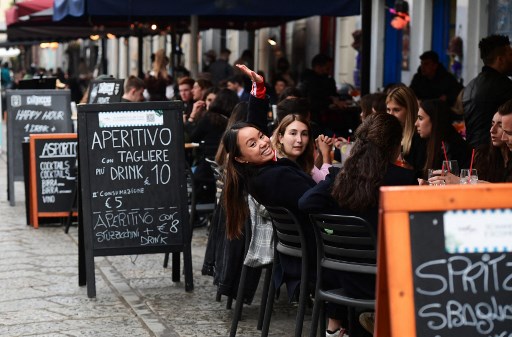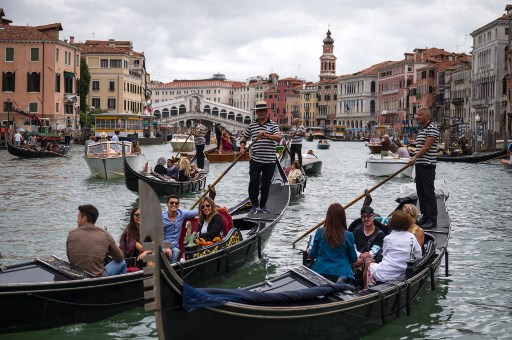Rules around travel to Italy and within the country have changed multiple times over the past two years. Unsurprisingly, they changed again just over a week ago.
On May 1st, Italy removed nearly all of its Covid-related social restrictions, including the so-called ‘green pass’ (or certificato verde), which was previously required to enter most venues across the country.
READ ALSO: Dining outdoors and hiking: How visitors plan to holiday in Italy this summer
As the bel paese moves past its former state of emergency and opens up again to international tourism, we asked readers whether they’ll be travelling to Italy this summer. Most said yes, although some of you had doubts and reservations about the Covid restrictions currently in place.
And you had some questions for us, too – mainly about what to expect once you arrive in the country.
Below are our answers, based on the Italian government’s latest decree and the current advice from the health ministry.
If you’re looking for a detailed look at the entry rules when travelling to Italy this summer, please find more information here.
Q: Does Italy still have vaccine requirements in place?
A: A valid Covid vaccination or recovery certificate will be required to enter Italy until at least May 31st, when the current travel rules expire.
As for travelling within Italy, as of May 1st, a valid health certificate is no longer required to access indoor venues and transport services. All visitors are free to travel across the country and enter restaurants, bars, cinemas, theatres and other indoor locations without having to provide a valid health pass.
READ ALSO: At a glance: What Covid-19 are now in place in Italy?
The only exception is for hospitals and care homes, which will continue to require a ‘green pass’ or its equivalent in the form of a foreign-issued vaccine or recovery certificate until December 2022.
Q: What kind of masks do you have to wear when travelling by train?
A: The use of FFP2 face masks is mandatory on all means of public transport, so not just trains but also buses, ferries and so on. Those equipped with a different type of face covering will be prevented from using the service.
The obligation to wear face masks on public transport will remain in place until at least June 15th.
Please note that FFP2 face masks are also required to enter the following indoor venues: cinemas, theatres, entertainment and sport venues (but not museums or galleries).
READ ALSO: Where do you still need to wear a mask in Italy from May 1st?
Q: Will more restaurants and shops be closed than normal?
A: No, quite the contrary. After a couple of rather grim years, things are apparently once again looking up for Italian tourism.
According to a survey from market research institute Demoskopika, the number of domestic and international tourists in Italy is set to rise by 43 percent compared to 2021. The first signs of such expected recovery manifested themselves over the Easter holidays, when some of the most popular Italian tourist destinations recorded ‘pre-pandemic’ numbers of visitors.
So, to answer the question, most local businesses will look to capitalise on the renewed inflow of both international and national tourists and will therefore keep their doors (and hearts, hopefully) open.

Q: I’m vaccinated but not ‘boosted’ and want to know if this is acceptable.
A: It is indeed.
For the sake of clarity, here are the current rules on the topic.
Until at least May 31st when the rules expire (they may either be scrapped or extended after this point; The Local will provide updates when the deadline approaches), travellers may enter the country if they are asymptomatic and can present one of the following:
- A Covid-19 vaccination certificate recognised by the European Medicines Agency (EMA). Presently, EMA recognises the following vaccines: Pfizer-BioNtech, Moderna, Vaxzevria Johnson and Johnson, Astrazeneca and Novavax. Please keep in mind that the minimum requirement is that you have fully completed the primary vaccination cycle (in this case, your pass will be valid for 9 months). For those who have already received a booster shot, the certificate is valid indefinitely.
- A valid medical certificate confirming recovery from Covid (this is valid for 6 months from the positive swab test)
- A negative molecular (PCR) test carried out within 72 hours of arrival in Italy or a rapid antigen test carried out within 48 hours of arrival
As previously mentioned, you won’t need a health pass (nor negative test result) to travel across the country.
Q: What type of health pass is needed for indoor dining from May?
A: None. No vaccination or recovery certificate is required to access bars and restaurants. Face masks are also no longer mandatory.
Having said that, the use of face coverings in all indoor settings is still “strongly recommended” by the government. Furthermore, some local businesses have chosen to independently enforce stricter rules and only allow people equipped with a face mask to enter their premises.
Q: What are the current restrictions for hotels, restaurants and museums?
A: There are no Covid-related restrictions (that is, not even face masks) for hotels, restaurants and museums.
However, as mentioned above, some businesses may choose to enforce their own rules and ask customers to wear a face covering. So, keep this in mind before you waltz into your local grocery store without a mask.

Q: What are the isolation rules if you test positive while visiting Italy?
A: If you test positive for Covid during your trip, you will have to self-isolate at your existing accommodation and notify the relevant local authorities (Aziende Sanitarie Locali, ASL) as soon as possible.
The Italian quarantine instructions are a bit of a head-scratcher, therefore we’ll try to summarise them as follows:
- Those who have received a ‘booster shot’, have completed the first vaccination cycle no more than 120 days prior to testing positive or have recovered from Covid no more than 120 days prior to testing positive will be required to self-isolate for at least seven days.
- All others will be required to self-isolate for at least 10 days, regardless of whether they are symptomatic or asymptomatic.
You’ll be able to exit your quarantine period by taking a molecular (PCR) or rapid antigen test.
READ ALSO: How tourists and visitors can get a coronavirus test in Italy
However, note that you will only be allowed to take such tests if you’ve shown no symptoms in the three days prior to the supposed date of the test. If you have, your self-isolation period will be extended.
For instance, if you’re supposed to get tested on the tenth day of your quarantine but show symptoms on the ninth, you’ll only be able to get tested on the twelfth.
Please note that The Local cannot advise on specific cases. For more information about how the rules may apply to you, see the Italian Health Ministry’s website or consult the Italian embassy in your country.
You can keep up with the latest updates via our homepage or Italian travel news section.



 Please whitelist us to continue reading.
Please whitelist us to continue reading.
Do you still need to fill up the ePLF before coming into Italy?
Also, I am taking a kid of 14 years old friend of my kids? With a letter from both parents with their data, allowing me to take this kid with us, will this be accepted?